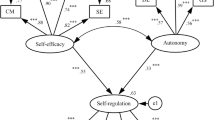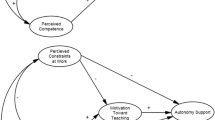Abstract
This exploratory study examined whether pre-service teachers’ professional commitment and sense of efficacy significantly predict their perceptions of unethical teacher behaviours. Specifically, the present study aimed to uncover the factors influencing pre-service teachers’ ethical stances that potentially shape their actions regarding the challenging aspects of the teaching profession during the early phases of their career. Correlation and structural equation modelling analyses were conducted to analyse the data reliably. The results showed that pre-service teachers’ planned efforts significantly predicted the sense of efficacy in addition to their perceptions of ‘offensive and discriminative teacher behaviours’ and ‘irresponsible and dishonest teacher behaviours’. Additionally, pre-service teachers’ sense of efficacy significantly mediated the relationship between career development aspirations and perceptions of ‘irresponsible and dishonest teacher behaviours’. The results suggest that considering pre-service teachers’ professional commitment with a sense of efficacy can provide a comprehensive framework for understanding pre-service teachers’ ethical stances on unethical teacher behaviours.

Similar content being viewed by others
References
Altınkurt, Y., & Yılmaz, K. (2011). Prospective teachers’ views about teachers’ occupational unethical behaviours. Mehmet Akif Ersoy Üniversitesi Egitim Fakultesi Dergisi, 22(1), 113–128.
Arbuckle, J. L. (2011). IBM SPSS Amos 20 user’s guide. Crawfordville: Amos Development Corporation.
Brown, T. A. (2015). Confirmatory factor analysis for applied research (2nd ed.). New York, NY: Guilford Press.
Bullough, R. V. J. (2011). Ethical and moral matters in teaching and teacher education. Teaching and Teacher Education, 27, 21–28.
Campbell, E. (2013). Ethical intentions and the moral motivation of teachers. In K. Heinrichs, F. Oser, & T. Lovat (Eds.), Handbook of moral motivation: Theories, models, applications (pp. 517–532). Rotterdam: Sense Publishers.
Campbell, E. (2014). Teaching Ethically as a Moral Condition of Professionalism. In L. Nucci, D. Narvaez, & T. Krettenauer (Eds.), Handbook of moral and character education (pp. 101–118). New York, NY: Routledge.
Cheung, G. W., & Rensvold, R. B. (2002). Evaluating goodness-of-fit indexes for testing measurement invariance. Structural Equation Modeling, 9(2), 233–255.
Coladarci, T. (1992). Teachers' sense of efficacy and commitment to teaching. Journal of Experimental Education, 4(40), 323–337.
Çakıroğlu, E., & Çakıroğlu, J. (2003). Reflections on teacher education in Turkey. European Journal of Teacher Education, 26(2), 253–264.
Davies, M., & Heyward, P. (2019). Between a hard place and a hard place: A study of ethical dilemmas experienced by student teachers while on practicum. British Educational Research Journal, 45(2), 372–387.
Dembo, M. H., & Gibson, S. (1985). Teachers' sense of efficacy: An important factor in school improvement. The Elementary School Journal, 86(2), 173–184.
Ding, A. C., & Wang, H. H. (2018). Unpacking teacher candidates’ decision-making and justifications in dilemmatic spaces during the student teaching year. Asia-Pacific Journal of Teacher Education, 46(3), 221–238.
Eldor, L., & Shoshani, A. (2016). Caring relationships among employees: Exploring the link between compassion, engagement, and work outcomes. Teaching and Teacher Education, 59, 126–136.
Eren, A. (2013). Prospective teachers' conceptions of assessment and efficacy beliefs: Values and practices. Eğitim ve Bilim-Education and Science, 38(170), 19–31.
Eren, A., & Rakıcıoğlu-Söylemez, A. (2017). Pre-service teachers' ethical stances on unethical professional behaviors: The roles of professional identity goals and efficacy beliefs. Teaching and Teacher Education, 68, 114–126.
Eren, A., & Tezel, K. V. (2010). Factors influencing teaching choice, professional plans about teaching, and future time perspective: A mediational analysis. Teaching and Teacher Education, 26, 1416–1428.
Eren, A., & Yeşilbursa, A. (2019). Pre-service teachers' teaching-specific hopes and their motivational forces: The roles of efficacy beliefs and possible selves. Teaching and Teacher Education, 82, 140–152.
Fan, X., & Sivo, S. A. (2007). Sensitivity of fit indices to model misspecification and model types. Multivariate Behavioral Research, 42(3), 509–529.
Fisher, R. J. (1993). Social desirability bias and the validity of indirect questioning. Journal of Consumer Research, 20, 303–315.
Fransson, G., & Frelin, A. (2016). Highly committed teachers: What makes them thick? A study of sustained commitment. Teachers and Teaching, 22(8), 896–912.
Gay, L. R., Mills, G. E., & Airasian, P. W. (2012). Educational research: Competencies for analysis and applications. London, UK: Pearson.
Gollwitzer, P. M. (1986). Striving for specific identities: The social reality of self-symbolizing. In R. F. Baumeister (Ed.), Public self and private self (pp. 143–159). New York, NY: Springer.
González, A., Conde, Á., Díaz, P., García, M., & Ricoy, C. (2018). Instructors’ teaching styles: Relation with competences, self-efficacy, and commitment in pre-service teachers. Higher Education, 75(4), 625–642.
Hamilton, M. L., Pinnegar, S., & Davey, R. (2016). Intimate scholarship: An examination of identity and inquiry in the work of teacher educators. In J. Loughran & M. L. Hamilton (Eds.), International handbook of teacher education (Vol. 2, pp. 181–237). Singapore: Springer.
Harmon-Jones, C., Schmeichel, B. J., & Harmon-Jones, E. (2009). Symbolic self-completion in academia: Evidence from department web pages and email signature files. European Journal of Experimental Social Psychology, 39, 311–316.
Hayes, A. F. (2013). Introduction to mediation, moderation, and conditional process analysis: A regression-based approach. New York, NY: Guilford Press.
Hobfoll, S. E. (1989). Conservation of resources: A new attempt at conceptualizing stress. American Psychologist, 44, 513–524.
Hobfoll, S. E. (2001). Conservation of resources: A rejoinder to the commentaries. Applied Psychology, 50(3), 419–421.
Hostetler, K. D. (1997). Ethical judgements in teaching. Boston, MA: Allyn and Bacon.
Ingersoll, R. M., Alsalam, N., Quinn, P., & Bobbitt, S. (1997). Teacher professionalization and teacher commitment: A multilevel analysis. Washington, DC: US Department of Education.
Kim, K. R., & Seo, E. H. (2018). The relationship between teacher efficacy and students' academic achievement: A meta-analysis. Social Behavior and Personality, 46(4), 529–540.
Klassen, R., & Tze, V. (2014). Teachers’ self-efficacy, personality, and teacher effectiveness: A meta-analysis. Educational Research Review, 12, 59–76.
Klassen, C. A., Osguthorpe, R. D., & Sanger, M. N. (2016). Teacher education as a moral endeavor. In J. Loughran & M. L. Hamilton (Eds.), International handbook of teacher education (pp. 523–557). Singapore: Springer.
Kruger, J., & Dunning, D. (1999). Unskilled and unaware of it: How difficulties in recognizing one's own incompetence lead to inflated self-assessments. Journal of Personality and Social Psychology, 77(6), 1121–1134.
Lauermann, F., & Karabenick, S. A. (2013). The meaning and measure of teachers’ sense of responsibility for educational outcomes. Teaching and Teacher Education, 30, 13–26.
Lavallee, C. F., & Persinger, M. A. (2010). A LORETA study of mental time travel: Similar and distinct electrophysiological correlates of re-experiencing past events and pre-experiencing future events. Consciousness and Cognition, 19(4), 1037–1044.
Le Cournu, R. (2015). Key components of effective professional experience in initial teacher education in Australia. Melbourne: Australian Institute for Teaching and School Leadership.
Lee, W. C., Chen, V. D. T., & Wang, L. Y. (2017). A review of research on teacher efficacy beliefs in the learner-centred pedagogy context: Themes, trends and issues. Asia Pacific Education Review, 18(4), 559–572.
LePage, P., Akar, H., Temli, Y., Şen, D., Hasser, N., & Ivins, I. (2011). Comparing teachers’ views on morality and moral education, a comparative study in Turkey and the United States. Teaching and Teacher Education, 27, 366–375.
Llorens, S., Bakker, A., Schaufeli, W. B., & Salanova, M. (2006). Testing the robustness of the job demands-resources model. International Journal of Stress Management, 13, 378–391.
Marquardt, M. K., Gantman, A. P., Gollwitzer, P. M., & Oettingen, G. (2016). Incomplete professional identity goals override moral concerns. Journal of Experimental Social Psychology, 65, 31–41.
Osguthorpe, R. D. (2009). On the possible forms a relationship might take between the moral character of a teacher and the moral development of a student. Teachers College Record, 111(1), 1–26.
Poulou, M. (2005). Perceptions of students with emotional and behavioural difficulties. Emotional and Behavioural Difficulties, 10(2), 137–160.
Preacher, K. J., & Hayes, A. F. (2008). Asymptotic and resampling methods for assessing and comparing indirect effects in multiple mediator models. Behavior Research Methods, 40, 879–891.
Puan, R. R., Malla, L., & Behera, S. K. (2014). Current ethical issues in teacher education: A critical analysis on pre-service and in-service emerging teachers. American Journal of Educational Research, 2(12A), 1–7.
Richardson, P. W., & Watt, H. M. G. (2006). Who chooses teaching and why? Profiling characteristics and motivations across three Australian universities. Asia-Pacific Journal of Teacher Education, 34(1), 27–56.
Richardson, P. W., & Watt, H. M. G. (2010). Current and future directions in teacher motivation research. In T. C. Urdan & S. A. Karabenick (Eds.), The decade ahead: Applications and contexts of motivation and achievement (pp. 139–173). Bingley, UK: Emerald.
Rissanen, I., Kuusisto, E., Hanhimäki, E., & Tirri, K. (2018). The implications of teachers’ implicit theories for moral education: A case study from Finland. Journal of Moral Education, 47(1), 63–77.
Sanger, M. N., & Osguthorpe, R. D. (2011). Teacher education, preservice teacher beliefs, and the moral work of teaching. Teaching and Teacher Education, 27(3), 569–578.
Schunk, D. H., & Pajares, F. (2005). Competence beliefs in academic functioning. In A. J. Elliot & C. Dweck (Eds.), Handbook of competence and motivation (pp. 85–104). New York, NY: Guilford Press.
Shapira-Lischshinsky, O., & Orland-Barak, L. (2009). Ethical dilemmas in teaching: The Israeli case. Education and Society, 27(3), 27–45.
Sharot, T., Korn, C. W., & Dolan, R. J. (2011). How unrealistic optimism is maintained in the face of reality. Nature Neuroscience, 14, 1475–1479.
Simbula, S., Guglielmi, D., & Schaufeli, W. B. (2011). A three-wave study on job resources, self-efficacy and work engagement among Italian school teachers. European Journal of Work and Organizational Psychology, 20, 285–305.
Strike, K. A., & Soltis, J. F. (2009). The ethics of teaching. New York, NY: Teachers College Press.
Tofur, S., Aypay, A., & Yücel, C. (2016). Comparative evaluation of the decisions of the Turkish national education council and indexes of the journal of announcements between 1980–2014. Education and Science, 41, 253–274.
Toom, A., Husu, J., & Tirri, K. (2015). Cultivating student teachers’ moral competencies in teaching during teacher education. In C. J. Craig & L. Orland-Barak (Eds.), International teacher education: Promising pedagogies (Vol. 22C, pp. 13–31). Bingley, UK: Emerald.
Tschannen-Moran, M., & Woolfolk Hoy, A. (2001). Teacher-efficacy: Capturing an elusive construct. Teaching and Teacher Education, 17(7), 783–805.
Tschannen-Moran, M., & Woolfolk Hoy, A. (2007). The differential antecedents of self-efficacy beliefs of novice and experienced teachers. Teaching and Teacher Education, 23(6), 944–956.
Ware, H., & Kitsantas, A. (2007). Teacher and collective efficacy beliefs as predictors of professional commitment. Journal of Educational Research, 100(5), 303–309.
Warnick, B., & Silverman, S. (2011). A framework for professional ethics course in teacher education. Journal of Teacher Education, 62(3), 273–285.
Watt, H. M. G., & Richardson, P. W. (2007). Motivational factors influencing teaching as a career choice: Development and validation of the FIT-Choice Scale. Journal of Experimental Education, 75(3), 167–202.
Watt, H. M. G., & Richardson, P. W. (2008). Motivations, perceptions, and aspirations concerning teaching as a career for different types of beginning teachers. Learning and Instruction, 18(5), 408–428.
Watt, H. M. G., Richardson, P. W., & Wilkins, K. (2014). Profiles of professional engagement and career development aspirations among USA preservice teachers. International Journal of Educational Research, 65, 23–40.
Wicklund, R. A., & Gollwitzer, P. M. (1982). Symbolic self-completion. Hillsdale, NJ: Erlbaum.
Wolters, C. A., & Daugherty, S. G. (2007). Goal structures and teachers' sense of efficacy: Their relation and association to teaching experience and academic level. Journal of Educational Psychology, 99(1), 181–193.
Yılmaz, K., & Altunkurt, Y. (2009). Öğretmen adaylarının mesleki etik dışı davranışlar ile ilgili görüşleri [Prospective teachers’ views about unethical professional behaviors]. Turkish Journal of Business Ethics, 2(4), 71–88.
Author information
Authors and Affiliations
Corresponding author
Additional information
Publisher's Note
Springer Nature remains neutral with regard to jurisdictional claims in published maps and institutional affiliations.
Rights and permissions
About this article
Cite this article
Eren, A., Rakıcıoğlu-Söylemez, A. Pre-service teachers’ professional commitment, sense of efficacy, and perceptions of unethical teacher behaviours. Aust. Educ. Res. 48, 337–357 (2021). https://doi.org/10.1007/s13384-020-00396-7
Received:
Accepted:
Published:
Issue Date:
DOI: https://doi.org/10.1007/s13384-020-00396-7




